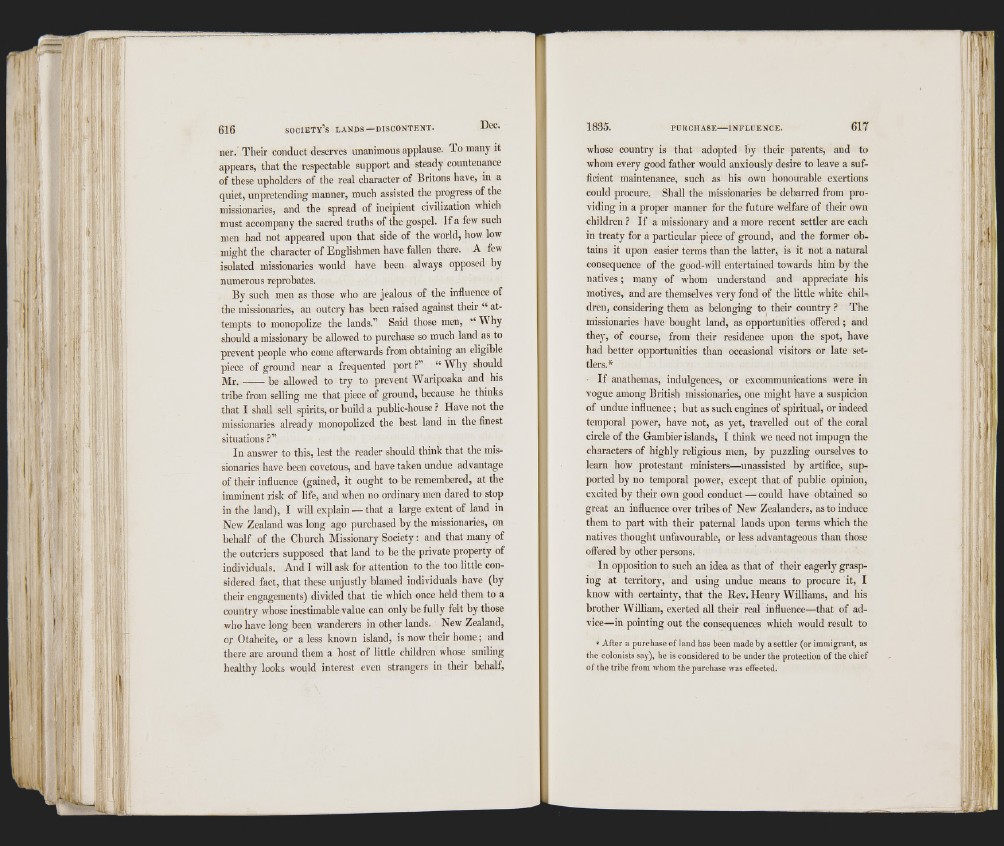
: i 11
,1 I ' r
•1 : ;
It nt!l
I?
L ;
616
ner. Their conduct deserves unanimous applause. To many it
appears, that the respectable support and steady countenance
of these upholders of the real character of Britons have, in a
quiet, unpretending manner, much assisted the progress of the
missionaries, and the spread of incipient civilization which
must accompany the sacred truths of the gospel. If a few such
men had not appeared upon that side of the world, how low
might the character of Englishmen have fallen there. A few
isolated missionaries would have been always opposed by
numerous reprobates.
By such men as those who are jealous of the influence of
the missionaries, an outcry has heen raised against their “ attempts
to monopolize the lands.” Said those men, “ Why
should a missionary be allowed to purchase so much land as to
prevent people who come afterwards from obtaining an eligible
piece of ground near a frequented port.?” “ Why should
M r . be allowed to try to prevent Waripoaka and his
tribe from selling me that piece of ground, because he thinks
that I shall sell spirits, or build a public-house ? Have not the
missionaries already monopolized the best land in the finest
situations.?”
In answer to this, lest the reader should think that the missionaries
have been covetous, and have taken undue advantage
of their influence (gained, it ought to be remembered, at the
imminent risk of life, and when no ordinary men dared to stop
in the land), I will explain — that a large extent of land in
New Zealand was long ago purchased by the missionaries, on
behalf of the Church Missionary Society: and that many of
the outcviers supposed that land to be the private property of
individuals. And I will ask for attention to the too little considered
fact, that these unjustly blamed individuals have (by
their engagements) divided that tie which once held them to a
country whose inestimable value can only be fully felt by those
who have long been wanderers in other lands. New Zealand,
Of Otaheite, or a less known island, is now their home; and
there are around them a host of little children whose smiling
healthy looks would interest even strangers in their behalf.
whose country is that adopted by their parents, and to
whom every good father would anxiously desire to leave a sufficient
maintenance, such as his own honourable exertions
could procure. Shall the missionaries be debarred from providing
in a proper manner for the future welfare of their own
children ? If a missionary and a more recent settler are each
in treaty for a particular piece of ground, and the former obtains
it upon easier terms than the latter, is it not a natural
consequence of the good-will entertained towards him by the
natives ; many of whom understand and appreciate his
motives, and are themselves very fond of the little white children,
considering them as belonging to their country ? The
missionaries have bought land, as opportunities offered ; and
they, of course, from their residence upon the spot, have
had better opportunities than occasional visitors or late settlers.*
If anathemas, indulgences, or excommunications were in
vogue among British missionaries, one might have a suspicion
of undue influence ; but as such engines of spiritual, or indeed
temporal power, have not, as yet, travelled out of the coral
circle of the Gambier islands, I tliink we need not impugn the
characters of highly religious men, by puzzling ourselves to
learn how protestant ministers—unassisted by artifice, supported
by no temporal power, except that of public opinion,
excited by their own good conduct — could have obtained so
great an influence over tribes of New Zealanders, as to induce
them to part with their paternal lands upon terms which the
natives thought unfavourable, or less advantageous than those
offered by other persons.
In opposition to such an idea as that of their eagerly grasping
at territory, and using undue means to procure it, I
know with certainty, that the Rev. Henry Williams, and his
brother William, exerted all their real influence—that of advice—
in pointing out the consequences which would result to
• After a purchase of land has been made by a settler (or immigrant, as
the colonists say), he is considered to be under the protection of the chief
of the tribe from whom the purchase was effected.
4 ' ! '
I
Í! i1
s ;
; 04Î
5:1a
114 J
i l v
I i, V
i